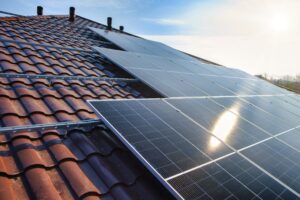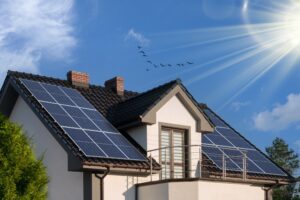Do solar panels work in winter? It’s one of the top questions that come up if you’re thinking about getting a solar PV system. After all, the UK is not known for its sunny weather. And yet, solar panels depend on the sun, don’t they?
Solar panels generate electricity via their solar cells, and they do need daylight to produce electricity. Notice how we said daylight, not direct sunlight. That’s because energy production doesn’t require wall to wall sunshine. A solar panel can still perform without sun. But can they work in winter where daylight hours are shorter?
The short answer is, they definitely still work. But let’s explore why that is…
How do solar panels work on non-sunny days?
The key thing to remember is that solar panels rely on light, not heat. When the temperatures drop, it may feel like the sun hasn’t come out, but it is there. Even on rainy days, light is diffused by the rain drops which is enough for your home solar kit to operate.
What is true though, is that we have shorter days in winter, which means less time available to soak up the sun.
Solar panel efficiency can certainly take a hit when the sun isn’t shining as often or for as long, such as during those shorter daylight hours we experience in the UK over winter months. But just because solar panel performance dips doesn’t mean it stops altogether.
The most efficient solar panels work in the winter effectively because they’re capable of solar power generation even when conditions are less than ideal such as in wintry, wet, and cold weather or cloud cover.
Isn’t winter the time when I need more energy, not less?
With additional heating and lighting, winter is obviously the time when we use the most energy. You may well use more energy than your solar panels can produce.
However, it’s worth remembering that the opposite is true in summer, when you will often produce more energy than you use. With the Smart Export Guarantee, you can earn money for that excess energy in summer, which can then help to offset any extra bills in winter.
Solar PV panels are incredibly efficient and solar panels work well enough in winter months, although solar panel output will inevitably drop due to the shorter days and less daylight for your solar panel system to work effectively.
If you’re considering installing solar panels at home, then it’s important you remember that most solar panels will have a small performance dip in winter compared to summer months.
- Create a Tailored Quote Based On Your Circumstances
- Takes Less Than 2 Minutes
- Fixed-Online Quotes

How much energy should my solar PV system produce in winter?
Energy generated by your solar panels will dip in winter. How much it will dip by depends on how harsh the winter is, how much daylight your solar panels are exposed to, and how effectively your solar panels work.
The best way to know for sure how your solar panels function in winter is to install solar panels. Of course, that sounds counterintuitive, but the point is, the only way you can compare its output in winter is to compare how they function in summer in the exact same location. The only fair comparison to do is look at your solar panels’ output in summer, and compare it to winter.
Some estimates, however, suggest that efficiency in winter may be around 10% of that in summer. Others suggest around one fifth – this seems a fairer assessment based on our experience at Effective Home.
So, do solar panels work in winter?
Yes, solar panels will absolutely still work in the winter months, but your solar panel performance will dip. Solar panels generate electricity in winter, but not nearly as much.
That means you may find that you rely on energy production from the National Grid more in winter, and far less in summer. Ultimately, these costs will balance out through the overall savings on your energy bills you make annually.
According to the Energy Saving Trust, you could save between £285 and £525 annually with solar panels providing renewable energy to power your home. The exact amount of savings change based on your location, how often you’re at home during the day (the longer you’re at home, the more savings you’ll make) and the price of fuel at the time of any comparison you make. The above estimates are made based on October 2023 fuel prices.
Despite your solar panels producing less electricity in winter, you’ll still make significant net savings each year on your energy bills meaning they will eventually pay for themselves in long term savings.
What about snow and solar panels?
Snow is the only weather that can really affect your solar panels because it can create a physical barrier between the panels and the sun. In the UK though, we rarely have enough snow for that to be a worry. Plus, even when we do, the snow will fall off soon enough thanks to the angle of the panels and their smooth surface.
Without direct or diffuse light being able to reach the solar panel and the solar PV cells beneath the snow, they won’t be able to produce power for your home. Electricity generation relies on the solar cells being exposed to some light.
Thankfully, snow will fall off solar panels rather quickly, and if ever they are stubborn, as soon as the snow starts to melt in the direct sunlight and on the black surface of the solar panels, it’ll slide right off and your solar panels will be back to operating efficiently again.
So, the temperature doesn’t make a difference to solar panels at all?
Actually, the temperature does matter a little bit, but probably not in the way you expected. Solar panels are more efficient in colder temperatures! Your panels aren’t in danger of overheating but, just like other electrical equipment, too much heat can put added stress on their components and reduce output efficiency by 10-25%.
Cold temperatures, however, are not an issue. So, your solar panels might not have as many operational hours in winter, but they will definitely make the most of them!
At what temperature do solar panels stop working?
As we stated above, it’s warm temperatures far more than cold ones that can affect solar panel performance. In fact, efficiency generally starts to drop off when temperatures reach over 25 degrees Celsius.
Extreme cold temperatures can also affect solar panels but they have to be below -40 degrees Celsius, so they aren’t temperatures we’re likely to deal with in the UK.
What’s the best time of year for solar panels?
The best time for solar panels is generally between May and July in the UK as this is the time of year when we experience the longest days in terms of daylight hours.
Longer days mean more electricity generated by your solar panels, and cheaper bills for you.
Do I need a solar battery for my solar panels in winter?
Shorter winter days are one of the biggest reasons why people get a battery with their home solar set-up. With a battery, you can generate energy during daylight hours, and store it for when the sun goes down. Then, when it’s dark and cold, you can still turn on extra lights and boost the heating without a worry.
Do solar panels work in winter: Round-up
Solar panels work in winter, they just don’t work as well as they do in summer and solar panel efficiency will drop off. But solar panels will still generate electricity during winter, and you’ll still be able to use that electricity to partially power your home. The rest will simply come from the National Grid like usual.
The point is, solar panels are an excellent choice for your home year-round, and you will benefit significantly from installing them. You’ll have a greener home, cheaper energy bills, and more energy security. What’s not to love?
Are you interested in solar power for your home? Get a quote today and our experts will talk you through your options.
- Create a Tailored Quote Based On Your Circumstances
- Takes Less Than 2 Minutes
- Fixed-Online Quotes




